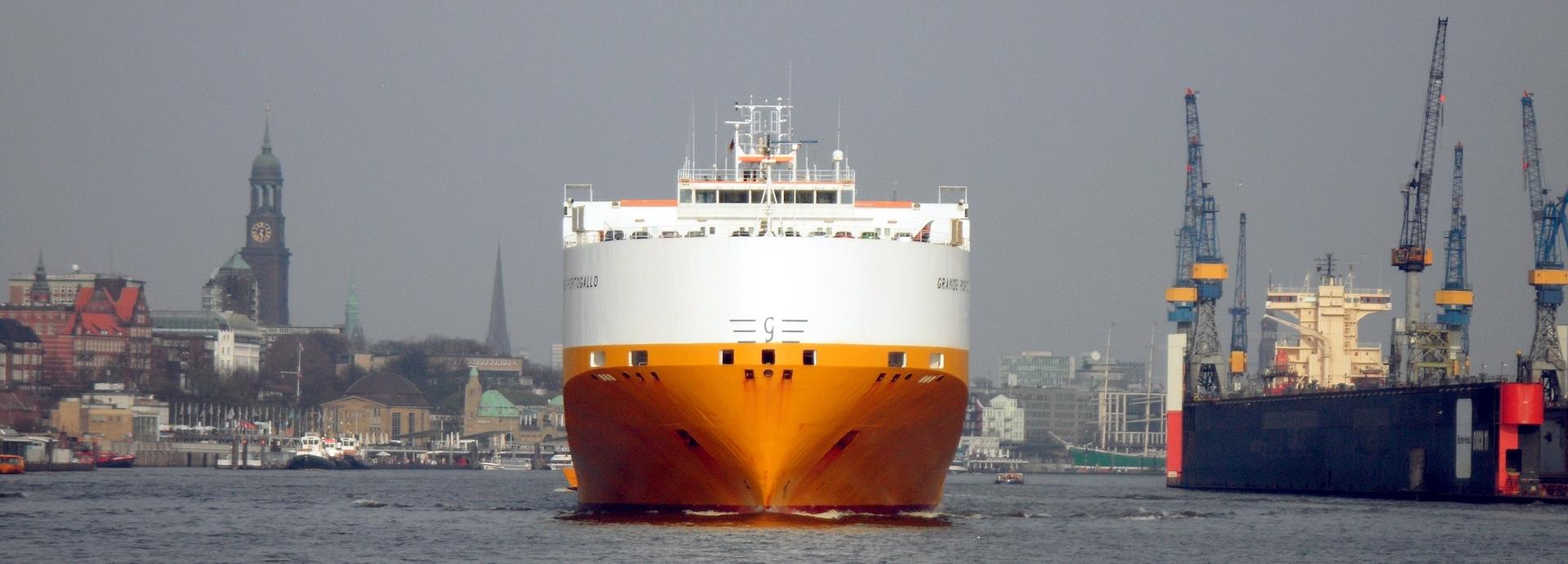

In June 2019, the Grimaldi Group’s Grande Portogallo, a 165-metre-long Pure Car & Truck Carrier fitted with a Controllable Pitch Propeller (CPP), set sail with a ground-breaking piece of technology onboard. This vessel had on-board a pre-swirl
stator (PSS) designed for CPP application that influences water flow to the propeller. Being able to control the inflow of water, say the device’s designers, has been scientifically proven to lead to less fuel consumption improving the vessel’s
energy savings. This has never been investigated for CPPs, making this a truly innovative product.
The test was a success, with the Grande Portogallo achieving confirmed fuel efficiency gains of up to 3.5%. This was a momentous achievement, especially considering the maritime industry’s drive to adopt new technologies that help in reducing
emissions, improving efficiencies and in turn, profitability.
“This represents a breakthrough in making ships with controllable pitch propellers more efficient, and therefore less polluting,” said Dario Bocchetti, Corporate Energy Saving Manager, Grimaldi Group.
Expert partnership to produce optimal results
The test was part of the LeanShips initiative, which is funded by the EU’s Horizon 2020 European Innovation project. It aims to demonstrate the effectiveness and reliability of energy-saving and emission-reducing technologies at full scale while supporting developments to make new and existing vessels more efficient and less polluting.
Wärtsilä worked with its partners, Netherlands-based Maritime Research Institute (MARIN) and Italian shipowner Grimaldi, to prove the efficiency of the PSS in meeting the project’s goals. The device was the culmination of a collaborative design and development process that saw each party bring its best to the table, providing the expertise and resources to test its energy-saving capabilities.
MARIN had previously collaborated with Wärtsilä on other propeller design projects including the GRIP project funded by the European Commission under the 7th Framework program. The synergies and learnings from these partnerships made working with Wärtsilä on the LeanShips project a foregone conclusion, says Maarten Flikkema, Senior Lead Project Manager at MARIN.
Long-term benefits for Wärtsilä and MARIN
Initiatives like the LeanShips have spurred a round of innovation and out-of-the-box thinking across the board.
This, in turn, has implications for future development as well. For instance, MARIN hopes to eventually integrate the optimisation of the four main components of a ship’s propulsion — the hull, energy savings device, main engine, and
propellers — to develop optimised systems. The theory is that optimising a ship’s whole system might lead to different (and better) outcomes than optimising each piece of the system in isolation.
“We think if you have a slightly less efficient hull, it could be that the interaction with the propeller goes up enough to offset the loss in efficiency due to the hull,” adds Flikkema.
This has huge implications for shipowners and ship operators who are scrambling to find ways and means to optimise their vessels and fleets.
“The development knowledge acquired in the LeanShips project will help with the commercialisation process for the PSS,” says Ebben, making it more readily available for the maritime industry to adopt.
Future collaboration opportunities
Both MARIN and Wärtsilä continue to work on propeller design projects, building on past learnings and providing incremental improvements. Since the PSS has to be customised for different ship types, they are already looking for ways and means to make the process more efficient.
This is important. An increasingly strict regulatory environment has made reducing marine emissions a dire necessity. For fleet operators like Grimaldi, the benefit of energy-saving devices is apparent: using less fuel to power a ship reduces operating costs and helps them meet environmental regulations.
In this context, demand for this and similar technologies emerging from the LeanShips initiative will only increase. Open collaboration and a smart marine ecosystem are the only way to ensure the development of tried and tested technologies to meet this demand.


